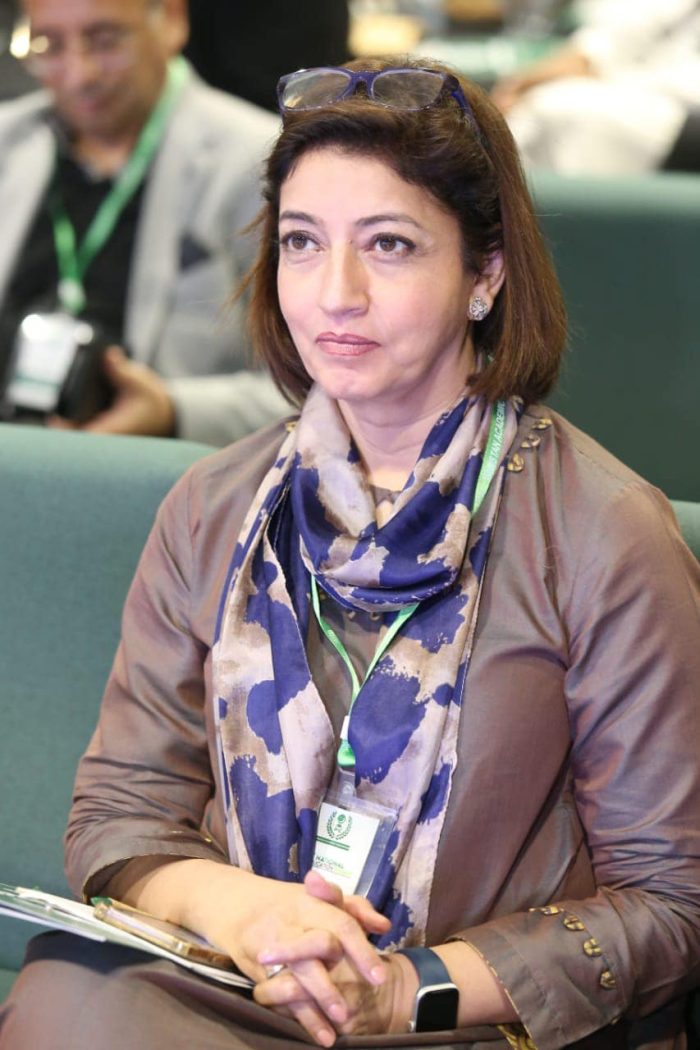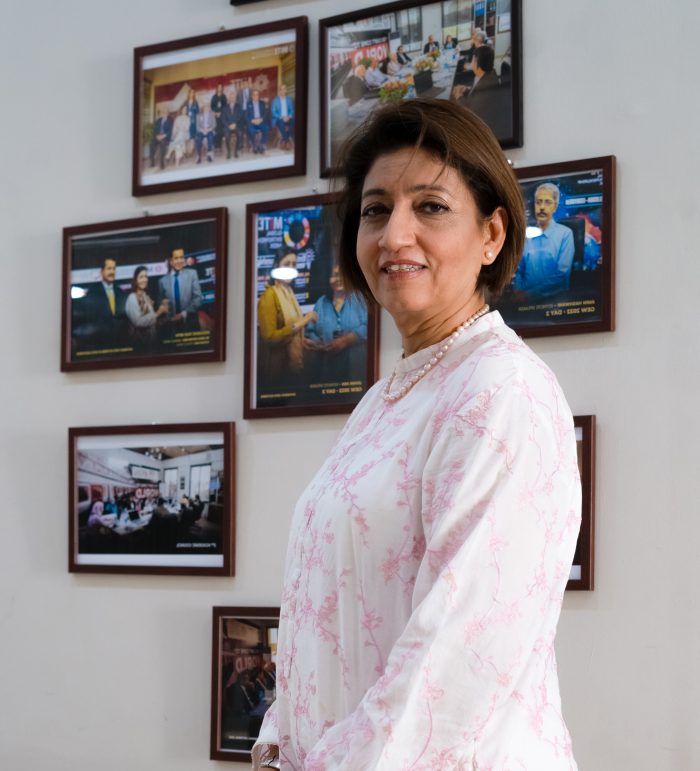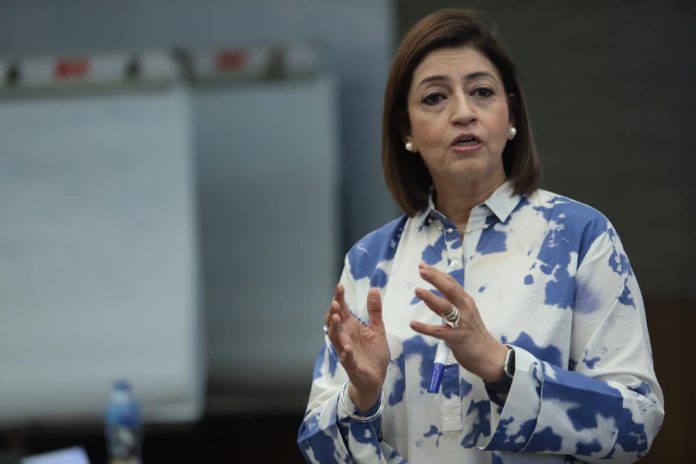Synergyzer: Who is Dr. Huma Baqai? Just walk us through your journey.
Huma Baqai: I am a very boring Professor, but at the end of the day, very happy to be that. It happened by default. I was a mother, and back then, everybody thought that teaching was something you could do with bringing up children and running the home. And I now strongly disagree because if you want to turn teaching into a career, it is a full-time demanding job as any other job, perhaps even more. But that was the reason I took it up.
I thought I had school-going children, and this was something that won’t clash with my responsibilities as a mom and as a homemaker. But it turned out that I spent more time at work than most corporate people do. May it was also because I had a passion for teaching. Teaching excited me, which I don’t do now in its traditional format because of the administrative position that I am in, but I miss teaching. It is addictive; you have a captive audience. They will listen to you. So what can be more addictive than that, right?
Synergyzer: What is your take on the current political scenario globally as well as locally in the last one and a half years?
Huma Baqai: I don’t think it has happened in the last one and a half years. It’s culminated to this point in the last one and a half years, and it has exploded in our faces. People who understood the situation said the country has been imploding from some ten years ago economically and socially. There is a governance crisis that is brewing, and for how long the so-called resilience of Pakistan could carry on? So now it’s come to a point where all of us are turning around and saying, when did this happen? Even today, if you go to a restaurant and the evening, there you have this French Revolution phenomenon here in Pakistan where people will turn around and say, I still have a 45-minute wait for the table; where is this economic recession?
You still have this counter-narrative, which is very unproductive. I think Pakistan is in a deep serious crisis, and we’ve had a fair share of crises in the past too. I’ve grown up listening to this sentence that Pakistan is at crossroads, and now I am pushing 60, so I don’t think it’s about being Pakistan at Crossroads. I think Pakistan always had a situation where the buck would stop somewhere. Either the buck would stop with the establishment or the Judiciary. So we at least had these two institutions, which could bring some sanity into the chaos, somehow that has come to an end.
So, what is different in the crisis you see right now is that we don’t know where the buck stops. It doesn’t stop with the establishment. It doesn’t stop with the Judiciary. The parliament is a joke, and the people are not factored in. So if we want the people to get factored in or their mandate, the buck should stop at the people; that’s what a democracy is all about, apparently; nobody’s prepared to let that happen. I use a famous term for Pakistan in all my tweets, and on Facebook, in the statuses that I put up, I see Pakistan as a Circustan. We’ve turned this country into a circus, both nationally and internationally.
Synergyzer: How do you think political developments are taking place? Pakistan is geographically strategically positioned; how do you think that will shape the future? How does it make Pakistan a brand in itself?
Huma Baqai: Syria collapsed, Iraq collapsed, and Libya collapsed. So very strategically placed countries in the world have collapsed. Lands don’t collapse; states collapse. This is the dangerous scenario that I’m talking about. And it doesn’t seem improbable right now. If we don’t put our house in order, it’s not just a cliché term I’m using here. I think the real stakeholders who have been silent Spectators so far need to come forward and do it on a war footing to resolve the situation.
Synergyzer: Who are these people?
Huma Baqai: I think this is the business community.

Synergyzer: How does the corporate sector play a part?
Huma Baqai: Partial responsibility is not limited to giving out money for some social cause, which is going to waste if you look around. World Bank report has come out today which says that our social indicators are so bad, they are akin to some of the poorest countries in the world to the point that we have a health emergency and we have an education emergency, and how do they put it around? They put it forward by saying that out of every 10 children, 8 children cannot read a simple text.
So if this is what is happening to our education, we have no place in this knowledge economy in the future. So, the 86.8 million people who, once again, the world economic Forum say is the workforce in Pakistan and can plug the global workforce gap will not be able to do it if this is the state of our imparting skills and developing education.
I just want to say something nice about Pakistan, and I can’t find that. I’ve been a professor almost all my life. Spent 25-plus years teaching young students, and I would always go into a classroom and say, no matter what is happening outside, this is the future of Pakistan. These are people who will probably turn this country around. This possibility is also becoming dim because we want these youth to dance in political rallies and want them to be “warriors” on social media. But please tell me how much money they are allocating to turn their future around.
Look at the figures of the demography of the voting that will happen.
I think the corporate sector should do it. I think the business community should do it, and I think it is the youth of Pakistan who should realize that they have the power of VOTE in their hand and they have the power of the street in their hands, and that is what they should use to make these politicians and all other stakeholders who act like vultures right now to change that behaviour, an alternative must emerge.
Synergyzer: Youth is all about social media and digital media, which shape the narratives built around politics and the country. What do you think about that? Is that being corporate-backed, or is that the youth playing its part?
Huma Baqai: Is it catching the imagination of the majority? This is a question you should ask. If it is, then it is the narrative of the nation. And that is true for everything. The Vietnam War was turned around because a few activists got up and said, America can’t be a part of this. The American foreign policy in South Africa changed because the blacks in America said that you can’t do this to people in South Africa.
So, I think it is me and you and us who have to turn around and say that stop. And I don’t know why this is not happening. I think this is what should happen. Of course, there is political branding. I mean, if this is why Imran Khan has “Bat,” and there is a reason why Karachi looks like there was “basant” around the year when the King was in power.
So yes, these symbols are displayed for the people’s sentiments.
Synergyzer: How does that shape public opinion? How do you think that is going to impact the political future?
Huma Baqai: We are so preoccupied with manufacturing consent or influencing public opinion that we forget there can be indigenous public opinion because there is a bombardment of information. We all know that people are getting information from everywhere.
The 80s and 90s are over, and PTV’s news no longer works. Right now, people don’t even look at the television. They get their information from social media, word of mouth, or going to rallies and seeing what’s happening. So, I think the whole concept of how political branding and political projections are being done will change. Yes, social media is going to play a huge role. But don’t forget that social media has an army of Citizen Journalists, me and you, who look at these opinions and then form their own opinions.
Something which is genuine and true will defeat fake names and fake narratives, and because everything is happening at such a tremendous pace, it doesn’t take a decade for exposures to happen. Exposures in today’s world happen within weeks and months. Look at the Tosha Khana fiasco. Look at the way it backfired. Nobody’s talking about it now because everybody seems to have been a part of it.
People are in a position to form informed opinions, but then, of course, you can go into the debate of the digital divide. First, it used to be the literate; now, it is the digitally literate who sort of develop or come up with the narrative that will become popular.
Synergyzer: What is your opinion on government lobbying? Government lobbying is going on, and then it is backed by the corporates and huge private sectors; what do you have to say about that?
Huma Baqai: Capitalism is just not economics. We now have capitalist-driven education systems, governance, and political paradigms. So yes, that kind of thing will remain; with this, you will have to factor in the people’s will. I think that is where the buck will stop, and even hardcore capitalist states today are talking about conscious capitalism. There is a global shift about how greed-driven capitalism has to end.
That is why May 1st is not celebrated anymore; there are protests on May 1st. So my post on May 1st was that the capitalist Seth and the elite enjoyed the first May holiday because the labour continued to labour. That’s the truth of the matter, isn’t it? Your driver was there, all the Salons were open, and all the restaurants and malls were open. Robots do not run them; they are run by people who have to be there to ensure you have a first May holiday. And that is the truth of capitalist-driven Paradigms, not just for politics but everything.
Synergyzer: How do you assess creating posters, and how do you assess the campaign’s ability? How do you assess virtual protests?
Huma Baqai: Everything is there. It is what we call the multiplying effect. If it catches the people’s imagination, there is a term that you people use, “it’s gone viral”. You can do as much boosting as you want but not go viral unless people, your social media consumer, pick it up, it resonates with them, and they repost it.
It’s all about reposting, the likes, and the traffic you get; boosting works to a certain point where you increase your visibility, but is it adopted? Is it accepted? It happens when it resonates with the people. Everything you do on social media today must resonate with the people, and of course, you’re coming up with artificial intelligence. It cannot completely change the narrative because when they do, it backfires. It can only go this far if it is countering the real sentiment on the ground.
Synergyzer: A lot of PR and comms technology is being used to make a larger business impact. How do you think that will help make a brand after Pakistan?
Huma Baqai: After Pakistan? I wish they were using it. They are not using it to the point where they could because it’s also extremely expensive. I know the kind of lobbying firms India engaged with to project and legitimize its gate-crashing nuclear club and how they have lobbyists working for the Indian cause everywhere at a very high cost.
It is strategic; it is about breaking the sound barrier. It is about projecting India as they would like to and remember how the Indians were angry about Slumdog Millionaire but how it changed the narrative of India in the world. Look at the movies that come out on Netflix from India, the kind of narrative they promote, so all of that works. But of course, there are people sitting who know that it’s a lie.
It’s very difficult right now to counter fake news; it’s almost taken us by surprise the speed of information and then the speed with which the manipulation of information is exciting. We have not been able to come up with what I call a counter-narrative or a counter-strategy because it is happening at an unbelievable pace.

Synergyzer: Don’t you think someone needs to take a stand?
Huma Baqai: Who is going to do that? That’s what I said; we don’t know where the buck stops. Does the buck stop at the United Nations? United Nations is manipulative. Let’s talk about global entities. Does the buck stop at IMF and FATF? Don’t we all say these are manipulative entities? The influence is run by one or the other. So the whole concept of a world based on equity has completely vanished. It’s a manipulated world, and there is no equity in this world. And that is why perhaps the global order is also collapsing. There was a concept that said having the same for others, what you want for yourself. So democracy, human rights, women’s rights, equal opportunity, right to development, right to education, and right to life is being used so selectively, and social media allows you to see the selective use of it. Then serious questions are asked, and an alternative thought process emerges, which I think is emerging. Is it finding the right kind of space to make an impact something that is yet to be seen as it is how I see it?
Synergyzer: Can you comment on policy decisions for the corporate world? How can we use PRs, comms technologies, and digital transformation for policy decisions?
Huma Baqai: I am going to say something which may be slightly provocative. I think the corporate sector is very selfish, and they are comfortable in their bubbles and have their exit strategies. These exit strategies will get exhausted. Once again, the business community and the corporate sector must come forward and use their influence and clout, which is immense on the government policymakers, politicians, and entities that matter to put the point across.
Right now, I think the masses and these power groups (I call them power groups) can still do something to trigger a change. We need an intervention because nothing is working. The so-called talks that gave some hope to some are also collapsing because everybody is not on board. So somebody has to make the buck stop somewhere. I wish I had something more positive to say right now.
Genuinely, I hope I’m not losing hope, but at the end of the day, I am. I look around at all the good people, the youth desperate to leave this country. That saddens me, and I look at how Western societies are sucking them up for their own good. I know people are getting immigration in three weeks, six weeks, or eight weeks if they have the right kind of credentials, and I wonder why can’t we do something to hold them back because they are our real strength.
Synergyzer: Is it the phenomenon that the grass is always greener on the other side?
Huma Baqai: I think it’s not about the grass being greener on the other side; it’s very tough, hardcore facts and statistics. Every primary student who qualifies to attend Primary School is enrolled in India. It’s enrolled in Bangladesh. Why can’t we get 100% primary education enrollment? Can you answer why eight out of ten children who go to school cannot read the text and cannot do simple math? Why are 40% of our children stunted? And if it’s our population growth, why are we not doing something about it? Has Bangladesh been a Muslim country, not controlled its population? Has Iran been a Muslim country and not controlled its population? Why can’t we do it? Why can’t somebody take responsibility for being unable to deliver to us, the people, not just the last four years, five years, ten years, across the last 17 years? We should get up and start asking questions, especially our youth.

